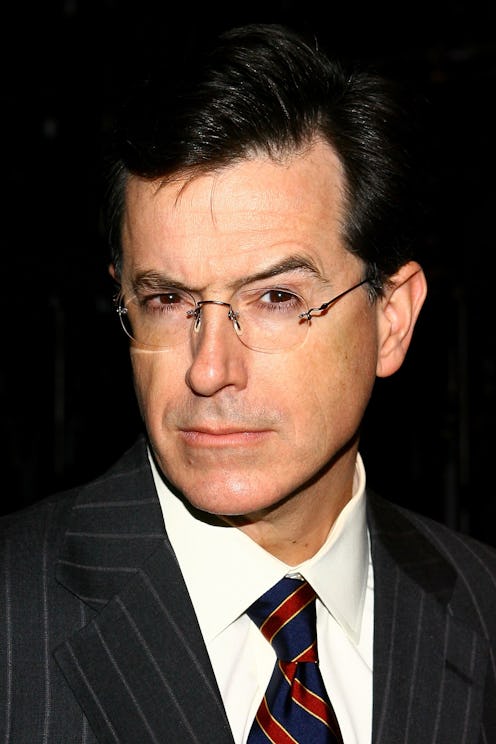Life
Your Criticisms Of Online Activism Are Lazy
After seeing that activist Suey Park started a #CancelColbert hashtag to criticize Stephen Colbert for anti-Asian racism in a segment on his show, I knew that things were going to rapidly get ugly. Whenever someone as beloved as Stephen Colbert is criticized for doing something problematic, the backlash is almost inevitable.
Once the Colbert Nation finished frothing at the mouth over Park’s “misunderstanding” of the comedian’s specific brand of satire, the conversation quickly turned to online activism as a whole. At The Atlantic, Conor Friedersdorf called Park's campaign "lazy" and "counterproductive."
To hear many (typically white, cisgender male) people tell it, online activism is just a bunch of angry people yelling into a void. It’s useless, and the commitment to “political correctness” means that nobody’s ever going to get anything done. Deadspin offered a particularly offensive definition of "hashtag activism."
But the root of Park's issue with the Colbert Report doesn't really matter, because her tweet riled up the perpetually riled-up segment of Twitter, and the #CancelColbert hashtag was soon flooded with a mind-warping mix of left-wingers and Asian activists refusing to understand satire and right-wing zealots who jumped on the opportunity to funnel as much false outrage as possible in Colbert's direction, all of this awfulness culminating in Dave Zirin showing his ass on Twitter. It was pretty stupid.
But we know that hashtag activism is actually making some people stand up and take notice. Stephen Colbert himself (or someone he allows to represent him online) responded to the hashtag started by Park. Even if he didn’t really apologize or join hands to sing with Suey Park, a 23-year old activist from Twitter made a hugely famous TV host take notice of his own racism.
There have been other instances where Twitter hashtags have cultivated important conversations about race, sexual assault, and gun violence, but the critics of online activism aren’t interested in those examples. Mikki Kendall, known as @Karnythia on Twitter, ignited a global conversation with her #SolidarityIsForWhiteWomen hashtag. Zerlina Maxwell, a frequent TV contributor and survivor, used #RapeCultureIs to highlight our society's pervasive rape culture.
They’ll tell you that these conversations don’t matter, even if they actually accomplished the intended goal. Even with worldwide news coverage of a Twitter hashtag, these critics still believe that this content and the people who create it are inconsequential. By dismissing it as "liberal infighting" and "not being able to take a joke," the power of Twitter and the people on it is diminished.
The critics are dead wrong. Social media has given people who have been continually passed over by traditional media sources due to biases of all types — racism, sexism, transphobia — a place to build a platform. Every user who joins Twitter starts with zero followers. It’s easy to build 10,000 followers sharing funny pictures like George Takei, but radical activism takes work. There isn’t exactly a massive audience of people who want to challenge the institutions of racism, sexism, and transphobia. Most people are there for the cat photos.
But the activists like Park and Kendall and Maxwell, who are dedicated to changing the way that people look at the world and just happen to use Twitter as their platform (or as part of their platform) are making a difference, even if people want to deny it. I can think of countless instances where a Tweet or a Tumblr post genuinely made someone, myself included, question their deeply held beliefs.
I’ve also seen people use Twitter to raise thousands of dollars for victims of abuse, for the legal funds of Marissa Alexander and CeCe McDonald, and to help trans women afford the healthcare they deserve. I’ve seen people use Twitter as a way to connect when they felt the most alone in the world, and cultivate very real friendships, even marriages.
I don’t feel like I should have to defend online activism or the way that people use Twitter to build communities. These criticisms of the work of people like Suey Park and Mikki Kendall are lazy. No one seems to have a good reason for why activists shouldn’t be doing work online. Why wouldn’t they take advantage of platforms that are largely free, where anyone, especially the people who are least likely to be represented in major media, can share their ideas with potentially millions of people?
If these critics think that online activism doesn’t matter, it might be time for them to check their privilege. If they don’t think these conversations of race and sexism are important, it could be because it’s difficult for them to see the importance from their privileged vantage point. It’s easy to say that conversations about racism and sexism are unimportant when you’re the one who should be listening, not talking.
Maybe, though, it doesn’t matter to them because a lot of these activists are saying things that they don’t want to hear. Many of these hashtag conversations have forced people to confront bigoted beliefs. It’s uncomfortable to be told that you’re doing something wrong, and the immediate response is always defensiveness.
If you aren’t doing any kind of activism on your own, you don’t get to sit anonymously behind your computer and talk shit to people who are creating and sharing powerful stories and ideas that you would never see in mainstream media. It’s impossible to ignore the fact that Suey Park, a young woman with a Twitter account and something important to say, made millions of people, beyond Stephen Colbert, take notice of anti-Asian racism. And that is far from useless.
